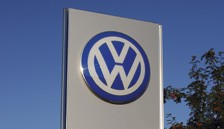2016 will be a landmark year for the Volkswagen Group.
Whilst coverage of this debacle has continued worldwide, each week brings a new twist and turn, although one would like to think that all the facts are now in the open.
The dramatic drop in new car sales is an underestimation of the impact the group has felt once pre-registration is also considered and there are a number of companies that have taken Volkswagen group cars off their ‘user chooser’ order lists.
This position may continue for some time whilst trust in the company is re-established.
From a used car perspective the chart on the next page shows an index of diesel car value performance in the market as a whole related to VW Group diesel products and then specifically VW diesel values.
Trade Price Index 7th December vs. 2nd July
VW brand vs. VW Group brands vs. all brands, Diesel 3-Year-Old Vehicles
Taken from a start point in July 2015 in a stable market, the chart clearly shows that VW Group diesels are now running at 0.8 points behind the rest of the market, whereas the Volkswagen brand diesel performance is running at 1.7 points behind the rest of the market.
As a comparison, the position at the time of the discovery of the emissions irregularities in the volatile September market showed Group diesel engine performance at 0.08 points behind the whole market, whilst Volkswagen brand diesels were running 0.13 points above the general diesel market.
What must also be considered is how the modifications to the affected engines will impact the market.
If assurances from Volkswagen that the cars will drive and perform in exactly the same way as they did prior to adjustment to meet NOX and CO2 emissions do not hold true, then there is likely to be a further adverse effect on the used values for a period of time.
Indeed there may be a number of cars that, as a direct result of reduced driving performance, do not have the update.
Aside from potentially damaging the environment and public health further, this will result in the need for the trade to rectify these cars when they are brought in as part exchanges so as to comply with requirements at a later date, creating longer term confusion.
2016 will also reveal how the ‘VWgate’ debacle may damage demand for diesel vehicles as a whole and potentially accelerate the shift to alternative fuel vehicles.
This would be a good thing in some respects but cause problems, specifically for the manufacturers, in other ways.
The penalisation of the industry as a whole as a result of one key player would be unfair but this is a real possibility.
It is worth noting that diesel engine market share for 2015 is down 1.7% on last year at the time of writing, whilst petrol has increased by 1% and alternative fuelled vehicles by 0.7%.
In summary, 2016 will be another enthralling year, fraught with risk yet with the potential for great success.
Generally speaking the picture is good and the UK car industry as a whole will enjoy another fine year of trading, excepting extreme events, and the year will prove exciting for those prepared to move fast and embrace technology.
The need for accurate values and relevant market intelligence to help guide them through the year will be critical and informed businesses will have the upper hand as the market evolves.
Author: Rupert Pontin, head of valuations, Glass’s



















Login to comment
Comments
No comments have been made yet.